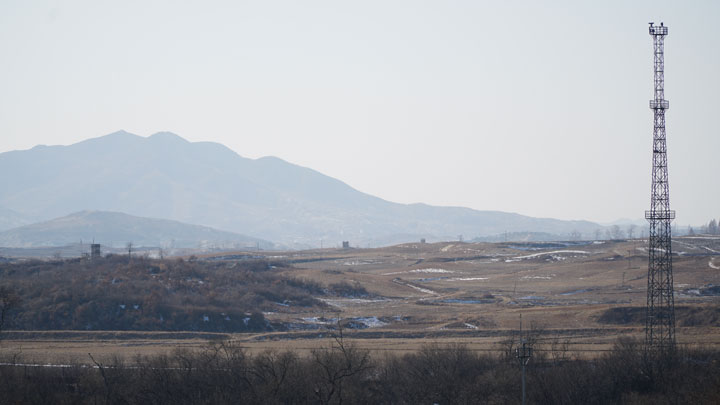A Canadian naval commander is in charge of monitoring one of the world’s most dangerous borders.

Commander Robert Watt is the chief of staff for the United Nations Command (UNC) Military Armistice Commission, a little-known military contingent which was set-up seven decades ago to supervise the ceasefire between North and South Korea.
“There’s no other military unit I’ve served in that does what we do,” Watt told Global News during a visit to the South Korean side of the Demilitarized Zone.
The DMZ is a 245-kilometre-long and 4-kilometre-wide buffer that separates North and South Korea, which are still technically at war. It’s located just an hour’s drive from the South Korean capital, Seoul, and is littered with land-mines and surrounded by artillery.

Last November, a North Korean soldier made a run for the South, fleeing across the DMZ under a hail of bullets. CCTV footage released by the UNC showed the defector being shot multiple times by North Korean soldiers. Incredibly, he was pulled to safety by South Korean soldiers and survived. “We’ve still got bullet holes in our buildings,” Watt said.
“We take the threat realistically. This is an enemy that has demonstrated its willingness to use violence.”
Watt said most people aren’t aware that Canadians are on the front lines of the frozen conflict. He’s one of four Canadian officers with the UNC based in South Korea.
“A lot of Canadians are aware that we played a big role in the Korean War itself,” Watt said. “But we’ve had people here ever since.”
The DMZ contains a meeting point called the Joint Security Area (JSA), where previous negotiations between the North and South have taken place inside the ironically-named ’Temporary’ blue buildings, which are now a permanent fixture.
While the Korean conflict is deadly serious, some of the exchanges at the JSA have become almost comical. North Korean soldiers often peer through the building’s windows at the South Koreans inside, observing and studying one another like alien life forms.
There is a joint phone line (nicknamed the “Bat Phone”), but Watt says the North rarely answer. Instead, when Watt’s team needs to relay a message to their northern neighbours, he’s come up with an unorthodox method of communication.
WATCH: Meet the Canadian commanding one of the world’s most dangerous borders

“We’ll come down with a megaphone,” he explained. “One of the translators will read the message to the North Koreans in both English and Korean. The North Koreans will send two soldiers down with a video camera and stand there videotaping it. It’s awkward, it’s certainly not the way we’d like to do things, but it is a roundabout way of doing communication.” And it’s been known to work. “North Korea will sometimes respond to us by putting a message in a newspaper,” Watt said.
Their communication is typically operational in nature; If there’s a fire in the DMZ, for example, South Koreans need to be able to extinguish the flames without getting shot and risk reigniting the war.
Last June, Watt made history by becoming the first officer to meet his North Korean counterpart face-to-face since 2013.
“I’m actually the only UNC officer who has stepped into a room with the North Korean army, at all,” he said.
Watt says North Korea’s participation in the Olympics has had a calming effect on the DMZ. But there’s speculation that once the Games are over, the United States may launch a so-called ‘bloody nose’ strike.
If that happens, Watt says, “We would almost right away be on the phone and outside (at the JSA), asking for talks with the North Korean military. That is the way that we’re going to keep things from escalating.”




Comments